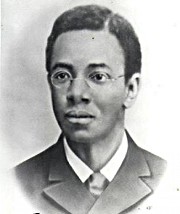Pezavia O’Connell holds the distinction of being the first principal of Princess Anne Academy with an earned doctorate.

O’Connell was born March 2, 1861 in Natchez, Miss., a Mississippi River port where “the South’s second largest slave market in the 19th century” operated.1
The 1880 U.S. census for Adams County, Miss. identified O’Connell, then 19, as the son of Richard O’Connell, a 48-year-old farmer. His occupation was recorded as working on the family farm, where he lived with his 9-year-old brother, also named Richard, who was attending school. O’Connell’s 1930 obituary identified his mother as Angeline O’Connell, but she is not listed in the 1880 census.
O’Connell initially enrolled at Jackson Baptist College before shifting to Wilberforce, a Methodist Episcopal university in Ohio. He eventually transferred to Gammon Theological Seminary, a prominent Methodist Episcopal school in Atlanta.2 Despite not holding a bachelor’s degree, normally a prerequisite, he earned a degree in divinity in 1888.
While serving as a pastor in Newark, N.J., O’Connell attended Columbia University and Union Theological Seminary in New York, where he “was considered the best Hebrewist in his class.”3
When he was appointed to Bainbridge Street ME church in Philadelphia, O’Connell enrolled in the University of Pennsylvania, where he earned a doctorate in Greek and Latin studies in 1898, making him the nation’s fifth Black to achieve that stature and the Ivy League school’s second to so.4
O’Connell’s time as Princess Anne Academy’s principal, which began in the fall of 1899, resulted in few discernible changes.5 Between 1900 and 1902, the academy’s enrollment surpassed 100 students, yet no new buildings were constructed and the curriculum remained unchanged.
O’Connell left Princess Anne Academy in 1902 for historic Ezion (Mt. Carmel) ME church in Wilmington, Del. to resume his career in the ministry. In 1905, he accepted an appointment from the Delaware Conference to serve as the Methodist Episcopal Church’s superintendent / presiding elder of the Salisbury, Md., district, a job he held for six years.6
He returned to teaching religious studies, initially at Howard University from 1911 until 1913, then at Gammon, where he became its first alumnus to be a faculty member.2
“Dr. O’Connell is a strong preacher and orator of the very best type. He is a student of men and affairs. He knows history, not only … of to-day but history of the past. He is familiar with literature of all departments,” theChristian Educator magazine noted.3
In 1920, O’Connell accepted an appointment to lead the history department at Baltimore’s Morgan College, also founded by the Methodist Episcopal Church. O’Connell hall, a men’s dormitory, was named in his honor.
O’Connell died Nov. 26, 1930 at age 69. He was survived by his wife of 42 years, Maria Jane (Johnson), and an adopted daughter, Helen Gertrude Roberts.
Of the four men who delivered eulogies at this funeral, three were white.7
The Journal of Negro History, housed in the University of Chicago’s archives, had this to say about O’Connell in a tribute after his passing:
“Dr. O’Connell easily took rank as one of the best thinkers and eloquent speakers in America. As a minister and lecturer, he always left the impression of his earnestness of purpose and devotion to the Christian ideal. He stood for nobility and purity in the pulpit and led an exemplary life. With the stimulus of a clean conscience, he was outspoken against vice and hypocrisy and consequently made enemies among whites and blacks who practice petty politics and live under the cloak of sham and hypocrisy.8“
O’Connell and his wife, also an educator, are interred at Mount Auburn Cemetery in Baltimore, according to their respective death notices published in the Baltimore Sun.
Footnotes:
1 – Historic marker; Mississippi Department of Archives and History.
2 – Official Journal and Yearbook of the Delaware Annual Conference, Methodist Episcopal Church, 68th session, April 1931, pg. 115.
3 – The Christian Educator, Nov. 1908, pg. 5.
4 – The Negro Year Book, 1914-15, pg. 231.
5 – 1899-1900 Annual Catalogue of Morgan College and branches, pg. 50.
6 – Official Journal & Yearbook of the Delaware Annual Conference, Methodist Episcopal Church, 62nd session April 1925, pg. 148.
7 – Afro-American newspaper, Dec. 6, 1930, pg. 3.
8 – Journal of Negro History, Jan. 1931, pg. 123.

